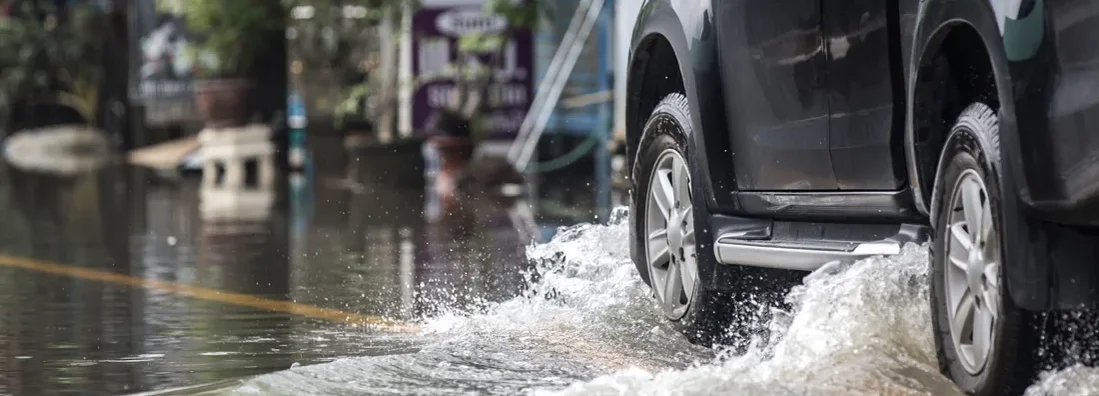Does Car Insurance Cover Flood Damage?

Jeff Green has held a variety of sales and management roles at life insurance companies, Wall street firms, and distribution organizations over his 40-year career. He was previously Finra 7,24,66 registered and held life insurance licenses in multiple states. He is a graduate of Stony Brook University.

Flood damage can wreak havoc on your vehicle’s engine, electrical components, metal frame, interior, and other parts. In fact, any vehicle that’s been totally submerged is usually considered a total loss by insurance. If your car is damaged by a flood, does your insurance cover it?
Some forms of car insurance do cover flood damage, but not all of them. It’s essential to understand your policy and coverage options so you’re prepared if your vehicle is ever affected by a flood. Let's dive into the basics of flood coverage for vehicles.
Does Comprehensive Car Insurance Cover Flood Damage?
Comprehensive car insurance is designed to provide coverage for a variety of non-collision damage, including theft, vandalism, and natural disasters. Under this type of policy, flood, hail, tornado, and other damage caused by storms and hurricanes is usually covered.
While many comprehensive policies offer this protection, the limitations and details of your exact coverage will likely vary by insurance provider and individual policy. Comprehensive coverage may also work a little differently than a standard policy, with its own deductible and claims process.
What Happens if Your Car Has Flood Damage?
Floodwater is often loaded with dirt, sand, chemicals, sewage, and debris. If these get into your car, they can cause several problems that impact performance, safety, and longevity, including:
- Rusting of metal parts like the body, battery, and hardware
- Malfunctioning electrical components, including headlights and windshield wipers
- Excessive wear or seizing of the transmission, brakes, and other components
- Mold and mildew that leave stubborn, unpleasant odors
- Discoloration of paint and interior surfaces
If your car insurance covers flooding, then it should help pay for associated repairs or replacements up to your policy’s limits.
Does Standard Car Insurance Cover Water Damage?
Most basic car insurance policies include bodily injury and property damage liability, medical payments or personal injury protection, and underinsured/uninsured motorist coverage, which are required in most states. Comprehensive and collision coverages are commonly added if more protection is desired.
Collision coverage helps cover damage caused by rolling your car or hitting another vehicle or object (like a mailbox), even if you’re at fault. Like comprehensive policies, it often has its own deductible. Without this coverage, you’d have to pay out of pocket if one of these events damages your car.
The only car insurance that covers water damage from rain and floods is comprehensive. Collision coverage provides no water damage or flood protection. Unless your insurer’s basic policy includes comprehensive coverage, it won’t cover flood damage.
Can You Purchase Comprehensive Insurance before a Flood?
To limit their risk, many insurers will implement binding restrictions when a major weather event is coming. Binding restrictions temporarily prevent customers from getting new or additional coverage right before a major event. This helps avoid a sudden influx of claims in order to maintain financial stability.
During binding restrictions, you may not be able to increase coverage limits or get new coverage. Binding restriction periods vary across insurance providers, but in general, you won’t be able to add or increase comprehensive coverage for your vehicle before a storm or flood, leaving you at risk.
This is why it’s important to be proactive in protecting your vehicle. You can’t wait until a threat is imminent to seek appropriate coverage. Speak to your independent insurance agent about reviewing your car insurance to make sure there are no gaps or exposures in your policy.
How to File Your Car Insurance Claim after Flooding
The steps to submit a claim for vehicle flood damage are much like other claim types: document the damage, report it to your agent, and work with adjusters to determine the cost and appropriate settlement. However, your experience during the process may be significantly different.
Events like floods tend to affect many policyholders in a given geographic area at the same time, and vehicles are commonly deemed total losses when damaged by flooding. Extensive inspections may also be needed to assess the extent of the flood damage to your car.
These factors tend to strain insurance providers’ financial and logistical resources. Timelines for processing flood claims may be abnormally long due to this strain and the often-complex nature of assessing flood damage.
Shop Comprehensive Insurance with an Independent Agent for Car Insurance Today
The sooner you add comprehensive coverage to your vehicle’s policy, the sooner you can rest easy knowing you’re protected from the financial hit of flood damage. Work with an independent insurance agent to assess your existing coverage and get a quote to better protect your vehicle – and your wallet – from flood damage.
Independent insurance agents have access to a large network of insurers and policies, helping connect you with the best deal on the right coverage.
https://www.iii.org/article/what-covered-basic-auto-insurance-policy
https://www.iii.org/article/what-auto-insurance
https://www.iii.org/article/flood-cars-how-to-avoid-purchasing-a-washed-up-vehicle
https://www.iii.org/article/what-is-covered-by-collision-and-comprehensive-auto-insurance
https://www.thezebra.com/auto-insurance/coverage/natural-disasters/does-car-insurance-cover-flood-damage/
